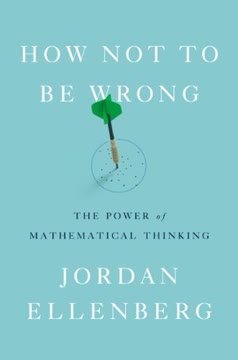Key Takeaways
1. Randomness plays a crucial role in shaping our lives and success
"Random events often come like the raisins in a box of cereal—in groups, streaks, and clusters."
Unpredictable factors influence outcomes. Our lives are continuously shaped by random events, much like the unpredictable distribution of raisins in cereal. These events can significantly impact our careers, relationships, and personal achievements. For example, a chance meeting might lead to a job opportunity, or an unexpected market shift could affect our investments.
Randomness creates both opportunities and challenges. While randomness can lead to unexpected successes, it can also result in unforeseen setbacks. Understanding this dual nature of randomness can help us:
- Remain open to new possibilities
- Develop resilience in the face of setbacks
- Recognize that not all outcomes are within our control
2. Human intuition often fails to grasp the true nature of probability
"Our brains are just not wired to do probability problems very well."
Misunderstanding probability leads to poor decisions. Human intuition often struggles with concepts of randomness and probability, leading to misconceptions and flawed decision-making. This is particularly evident in areas such as:
- Gambling and lottery participation
- Financial investments
- Risk assessment in everyday life
Overcoming intuitive biases requires conscious effort. To make better probability-based decisions, we need to:
- Educate ourselves on basic probability concepts
- Use tools and frameworks to analyze situations objectively
- Be aware of our tendency to misinterpret random events
3. The normal distribution and the law of large numbers explain many phenomena
"The normal distribution not only helps us understand such discrepancies, but also has enabled a myriad of statistical applications widely employed today in both science and commerce."
The bell curve describes many natural and social phenomena. The normal distribution, or bell curve, is a powerful tool for understanding variability in many fields:
- Physical measurements (height, weight)
- Test scores and academic performance
- Financial market returns
Large samples tend to represent the underlying population. The law of large numbers states that as a sample size increases, its mean will approach the true population mean. This principle is crucial for:
- Conducting accurate polls and surveys
- Assessing the reliability of experimental results
- Understanding the long-term behavior of random processes
4. Past patterns don't guarantee future outcomes in random processes
"If events are random, we are not in control, and if we are in control of events, they are not random."
The gambler's fallacy leads to faulty predictions. People often mistakenly believe that past events in a random process influence future outcomes. This misconception can lead to poor decision-making in various contexts:
- Gambling and betting strategies
- Financial investments
- Predicting "hot streaks" in sports
Recognizing true randomness is crucial. To avoid falling prey to the gambler's fallacy:
- Understand that each event in a truly random process is independent
- Base decisions on current probabilities rather than past outcomes
- Be skeptical of patterns in small sample sizes
5. Cognitive biases distort our perception of randomness and causality
"People systematically fail to see the role of chance in the success of ventures and in the success of people."
Confirmation bias reinforces existing beliefs. We tend to seek out information that confirms our preexisting notions and ignore contradictory evidence. This bias affects our interpretation of random events by:
- Attributing success to skill and failure to bad luck
- Overestimating our ability to predict outcomes
- Ignoring the role of chance in favorable results
Hindsight bias creates false narratives. After an event occurs, we often believe we could have predicted it. This leads to:
- Overconfidence in our ability to foresee future events
- Misattribution of causality in complex situations
- Failure to learn from truly unexpected outcomes
6. Success is often a combination of skill, perseverance, and chance
"It is more reliable to judge people by analyzing their abilities than by glancing at the scoreboard."
Talent alone doesn't guarantee success. While skill and hard work are important, random factors often play a significant role in determining outcomes. This is evident in various fields:
- Business: Market conditions and timing can greatly influence a company's success
- Arts and entertainment: Breakthrough moments often depend on chance encounters or unexpected opportunities
- Scientific discoveries: Serendipity has played a role in many important findings
Persistence increases the likelihood of success. By continually putting ourselves in positions to succeed, we increase our chances of benefiting from random positive events. This approach involves:
- Developing a growth mindset
- Learning from failures and setbacks
- Maintaining effort over long periods
7. Understanding randomness can lead to better decision-making and resilience
"The first step is to realize that success or failure sometimes arises neither from great skill nor from great incompetence but from, as the economist Armen Alchian wrote, 'fortuitous circumstances.'"
Acknowledging randomness reduces stress and blame. Recognizing the role of chance in outcomes can lead to:
- Greater empathy for others' failures
- Reduced self-blame for setbacks
- More realistic expectations for success
Adapting to uncertainty improves decision-making. By embracing the unpredictable nature of life, we can:
- Focus on processes rather than outcomes
- Develop contingency plans for various scenarios
- Remain flexible and open to new opportunities
8. The illusion of control affects our interpretation of events
"While people may pay lip service to the concept of chance, they behave as though chance events are subject to control."
Overestimating personal control leads to flawed judgments. People often believe they have more influence over random events than they actually do. This illusion of control can result in:
- Unnecessary stress when outcomes don't match expectations
- Overconfidence in risky situations
- Failure to recognize the limits of personal agency
Balancing control and acceptance improves well-being. To navigate uncertainty more effectively:
- Focus on controllable factors while acknowledging randomness
- Develop strategies to cope with unpredictable outcomes
- Cultivate a mindset that embraces both effort and chance
9. Statistical thinking is essential for interpreting data and making predictions
"Scientists have moved to protect themselves from identifying false patterns by developing methods of statistical analysis to decide whether a set of observations provides good support for a hypothesis or whether, on the contrary, the apparent support is probably due to chance."
Statistical literacy helps avoid misinterpretation. Understanding basic statistical concepts is crucial for:
- Evaluating scientific claims and research findings
- Making informed decisions based on data
- Recognizing when correlations imply causation
Key statistical concepts for everyday life:
- Sample size and representativeness
- Correlation vs. causation
- Statistical significance
- Regression to the mean
10. Hindsight bias leads to overconfidence in our ability to predict outcomes
"After the event, of course, a signal is always crystal clear; we can now see what disaster it was signaling…. But before the event it is obscure and pregnant with conflicting meanings."
Past events seem more predictable than they were. Hindsight bias causes us to overestimate our ability to have foreseen past events, leading to:
- Overconfidence in future predictions
- Unfair blame for decision-makers who faced uncertainty
- Failure to learn from truly unexpected outcomes
Combating hindsight bias requires conscious effort:
- Document predictions and decision-making processes
- Regularly review and analyze past decisions
- Acknowledge the role of chance in both successes and failures
Last updated:
FAQ
What's The Drunkard's Walk about?
- Exploration of randomness: The book examines how randomness influences our lives, decisions, and perceptions, often in ways we don't realize.
- Historical context: Leonard Mlodinow provides a historical overview of probability theory, highlighting contributions from figures like Gerolamo Cardano and Blaise Pascal.
- Real-life applications: It illustrates how randomness affects everyday situations, from gambling to decision-making, helping readers recognize the role of chance in their lives.
Why should I read The Drunkard's Walk?
- Enhances critical thinking: The book sharpens your understanding of probability and randomness, encouraging you to question assumptions and recognize biases.
- Practical insights: Mlodinow offers practical insights applicable to investing, parenting, and health, leading to better decision-making.
- Engaging narrative: The book combines storytelling with scientific concepts, making complex ideas accessible and enjoyable.
What are the key takeaways of The Drunkard's Walk?
- Role of chance: Chance plays a significant role in our lives, often more than we realize, influencing outcomes beyond skill or effort.
- Misinterpretation of data: People often misinterpret statistical data, leading to flawed conclusions, as illustrated by concepts like the "law of small numbers."
- Understanding probability: Readers gain a better understanding of probability, learning to assess risks and make informed decisions.
What are the best quotes from The Drunkard's Walk and what do they mean?
- "Life is both hard to predict and hard to interpret." This quote emphasizes life's unpredictability due to randomness, suggesting our attempts to make sense of events can lead to misunderstandings.
- "Success or failure sometimes arises neither from great skill nor from great incompetence but from fortuitous circumstances." It highlights that many outcomes are determined by chance rather than individual merit.
- "The human mind is built to identify for each event a definite cause." This points to a cognitive bias where people seek clear explanations, often overlooking randomness.
How does Leonard Mlodinow explain randomness in The Drunkard's Walk?
- Randomness defined: Mlodinow defines randomness as the lack of a predictable pattern or order in events, influencing many processes in nature and human affairs.
- Drunkard's walk metaphor: The title refers to a mathematical concept describing random motion, illustrating life's unpredictability.
- Impact on decision-making: Understanding randomness can improve decision-making by recognizing when chance influences choices.
What is the "law of large numbers" as discussed in The Drunkard's Walk?
- Definition of the law: It states that as the number of trials increases, observed frequencies of outcomes converge to their expected probabilities.
- Jakob Bernoulli's contribution: Bernoulli formalized this concept, explaining why larger samples yield more reliable results.
- Practical implications: It has applications in finance, medicine, and social sciences, emphasizing the importance of sufficient trials for accurate estimates.
What is the "gambler's fallacy" mentioned in The Drunkard's Walk?
- Definition of the fallacy: The gambler's fallacy is the mistaken belief that past independent events influence future outcomes in random processes.
- Psychological implications: This fallacy arises from cognitive biases and the human tendency to seek patterns in randomness.
- Real-life examples: It manifests in contexts like sports betting and stock market investments, leading to poor decision-making.
How does Mlodinow address the concept of "false positives" in The Drunkard's Walk?
- Understanding false positives: A false positive occurs when a test incorrectly indicates the presence of a condition, relevant in medical testing and statistical analysis.
- Bayesian perspective: Bayesian analysis helps assess the likelihood of false positives by considering prior probabilities and condition prevalence.
- Implications for decision-making: Understanding false positives is crucial for informed decisions, especially in healthcare and legal contexts.
What is the "Monty Hall problem" and how is it explained in The Drunkard's Walk?
- Overview of the problem: It involves a game show scenario where a contestant chooses between three doors, with a prize behind one.
- Counterintuitive solution: Switching doors increases the contestant's chances of winning from 1/3 to 2/3, illustrating how probabilities shift.
- Importance of understanding: The problem shows how human intuition can be misleading in probability, encouraging critical thinking.
How does The Drunkard's Walk relate to decision-making in everyday life?
- Influence of randomness: Recognizing randomness's role can lead to better decision-making, avoiding reliance solely on intuition.
- Application of probability concepts: The book encourages applying concepts like the law of large numbers to everyday situations.
- Improving judgment: It aims to improve judgment by fostering a deeper understanding of randomness and probability.
What is the butterfly effect, and how is it explained in The Drunkard's Walk?
- Definition of the butterfly effect: It refers to small changes in initial conditions leading to vastly different outcomes.
- Lorenz's discovery: Edward Lorenz found that tiny data differences could lead to dramatically different weather predictions.
- Implications for life: The butterfly effect applies to many life aspects, highlighting chance's role in shaping experiences.
How can I apply the concepts from The Drunkard's Walk to my life?
- Embrace uncertainty: Accepting randomness as a natural part of life can lead to more informed decisions and reduced anxiety.
- Learn from failure: Viewing failures as growth opportunities encourages risk-taking and pursuing new opportunities.
- Cultivate awareness: Understanding chance and cognitive biases can improve decision-making and provide a nuanced life perspective.
Review Summary
The Drunkard's Walk explores how randomness and probability impact our lives, often more than we realize. Reviewers found it accessible and engaging, praising Mlodinow's use of anecdotes and historical examples to explain complex statistical concepts. Many appreciated the book's insights into decision-making and success, though some felt it lacked depth or novelty. Overall, readers found it thought-provoking and valuable for understanding the role of chance in everyday life, despite occasional criticisms of its pacing or content density.
Similar Books








Download PDF
Download EPUB
.epub digital book format is ideal for reading ebooks on phones, tablets, and e-readers.









